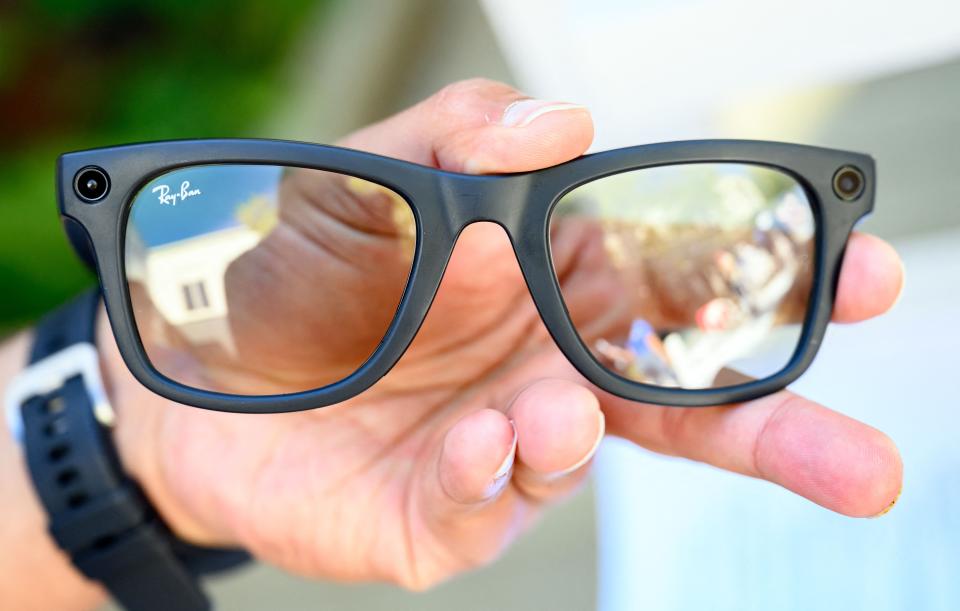Sergey Brin says Google was 10 years too early with Google Glass — but they'd be perfect for AI

- Oops!Something went wrong.Please try again later.
Sergey Brin said at Google I/O that Project Astra is "the perfect hardware" for smart glasses.
Google's cofounder said the tech giant was a decade too early with Google Glass, which famously flopped.
Google revealed Project Astra on Tuesday, an AI agent that was also working on prototype glasses.
Google introduced a collection of AI updates and new releases at its I/O event Tuesday, including Project Astra, an AI agent that can understand and recall objects in the real world through your phone camera.
At one point in the demo, the user puts on some prototype smart glasses and continues the conversation with the AI agent — which immediately caused some to speculate that Google Glass could make a return.
Google cofounder Sergey Brin didn't discourage the idea when he was interviewed by reporters following the event.
Brin, who stepped down as president of the company in 2019, told reporters at the conference that Project Astra is the "perfect hardware" for AI-powered glasses, according to a CNET report.
"It's funny, because it's like the perfect hardware," Brin said. "It's like the killer app now, 10 years later," referring to the idea of an AI agent running on smart glasses like the ones the company released a decade ago.
Brin showed off Google Glass onstage at Google I/O 2012, showcasing their video capture ability.
Google first released the smart glasses to a select number of testers in 2013 before rolling sales out more widely in 2014. Controlled by voice command or the touchpad along its side, the $1500 Google Glass Explorer Edition could do things like send texts or capture photos and video.
Google Glass existed for nearly 10 years, with the company launching two Enterprise editions before the company stopped selling the glasses altogether.
But they famously flopped, failing to gain traction mainly because the product lacked a so-called killer app that would make the glasses a must-have. Reviews weren't kind, either. Users complained about short battery life, slow uploading, poor camera quality, and spotty voice recognition. Others didn't like the idea of being recorded out in public.
10 years later, Brin said he still thinks the form factor of Google Glass was "pretty cool."
"Unfortunately, we sort of messed up on the timing," he said, according to a Bloomberg report. "I sort of wish I timed it a bit better."
Brin said "hands-free is the idea," and pointed to other companies' AI efforts in making wearable clips and similar devices that allow consumers to interact with AI more inconspicuously, according to the report.
"A lot of things you want commentary on: You're cooking or doing some sport, or you want this thing to help you," Brin said, according to Bloomberg. "It's awkward to do it with your hands also holding your phone."
Sergey isn't the only one hinting about the return of Google Glass. In an interview with CNBC on Tuesday, Google CEO Sundar Pichai teased the possible return of the device — or at least smart glasses of some sort — integrated with a Project Astra AI agent.
"Project Astra shines when you have a form factor like glasses," Pichai told CNBC. "We are working on prototypes."
Google's rival Meta is the leader in wearable AI devices at the moment, thanks to its unexpected hit with the Meta Ray-Bans, which start at $299. The glasses don't have any screens, but they do have cameras and speakers, allowing you to interact with Meta's AI assistant and capture photos and video, along with identifying objects or locations in front of the user.

Zuckerberg has said sales of the glasses have exceeded expectations, and the company has expanded the lineup. During Meta's first-quarter earnings call, the CEO said he thought the glasses had "the ability to be a pretty meaningful and growing platform" sooner than he expected.
Amazon also launched its own version of smart glasses in 2019. The Alexa-enabled Echo Frames sell for about $250 and offer similar perks as AirPods, allowing users to listen to music, hear incoming notifications, and ask questions to its Alexa virtual assistant.
Other wearable AI gadgets haven't fared as well. The $699 Humane AI Pin, which also requires an additional $24 monthly subscription, has been criticized for its limited capabilities. The company, and other AI-dedicated devices — face the challenge of convincing people that the device offers features consumers couldn't find in a smartphone.
But as companies like Google and OpenAI show off just how impressive the next level of AI is, don't be surprised if the idea of AI glasses gains more traction.
Do you have a Google tip? We want to hear from you. Contact the reporter from a non-work email and device at aaltchek@insider.com.
Read the original article on Business Insider

